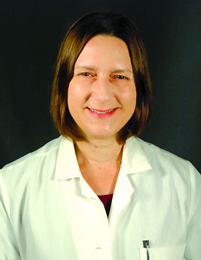
Deana Lazaro, MD, began her career as a rheumatologist at the Brooklyn Veterans Hospital, where she later became the chief of rheumatology in 1999. As her career progressed, she saw her involvement with the education of students and fellows grow. In 2003, she became the program director of State University of New York (SUNY) Downstate’s Rheumatology Fellowship Program.
The Foundation helped Dr. Lazaro’s role as an educator expand after her mentor, Ellen Ginzler, MD, MPH, Chief of Rheumatology at SUNY Downstate Medical Center, encouraged her to pursue funding opportunities through the Foundation. In 2007, Dr. Lazaro received what was known then as the Innovative Teaching Grant, which allowed her to develop electronic courseware to share information and easily communicate with fellows despite their busy schedules. This grant helped solve a major communication issue within her fellowship program and later became the model for other fellowship programs within the institution.
In 2009, Dr. Lazaro received additional Foundation funding through the Clinician Scholar Educator Award, which supports educators dedicated to developing new and improved programs to enhance education in musculoskeletal and rheumatic diseases for future doctors and rheumatology health professionals. With the award, she was able to attend the Harvard Macy Institute Program for Educators in the Health Professions to further her own studies in education theory and research.
“Because of these funding opportunities provided by the Foundation, I have been able to develop a better rheumatology elective experience for our medical residents and am able to better communicate with my students,” she said.
Dr. Lazaro is extremely thankful that she was encouraged to apply for funding and hopes that more rheumatologists learn about the wonderful opportunities the Foundation presents. Especially in underfunded academic positions, the Foundation helps support rheumatology professionals to allow the continuation of their passion in education. This work helps strengthen the future of rheumatology.
“Without the academic community, there can be no more practice. All practicing physicians have to go through a training program, which furthers our knowledge and creates a wellspring for the entire field,” she said.
Dr. Lazaro will be serving as a moderator for Innovative Educators, Novel Techniques: A Rheumatology Research Foundation Special Session from 2:30 – 4:00 pm on Tuesday. The session features research conducted by CSE Award recipients.
